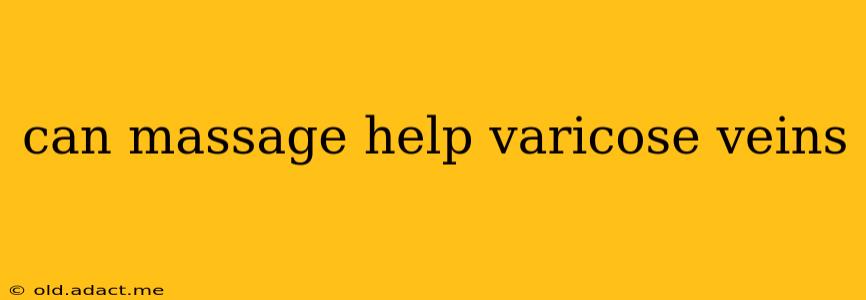Can Massage Help Varicose Veins? Exploring the Benefits and Limitations
Varicose veins, those unsightly and sometimes painful swollen veins, affect millions. While massage therapy isn't a cure, it can offer some relief from associated symptoms. However, it's crucial to understand its limitations and when to seek professional medical advice. This article explores the potential benefits and drawbacks of massage for varicose veins, addressing common questions surrounding this topic.
Does massage help reduce the appearance of varicose veins?
Massage can't magically make varicose veins disappear. The underlying cause of varicose veins – faulty valves in the veins preventing proper blood flow back to the heart – remains unchanged by massage. However, gentle massage can improve circulation in the surrounding tissues, potentially reducing swelling and inflammation, which might slightly improve the appearance of the veins by minimizing the bulging effect. The improvement is likely to be subtle and temporary.
Can massage help with the pain and discomfort of varicose veins?
Many people experience pain, aching, throbbing, or cramping associated with varicose veins. Gentle massage techniques focusing on the affected area can help alleviate some of this discomfort. By improving blood flow and reducing muscle tension, massage can promote relaxation and reduce pain sensations. However, aggressive massage is strongly discouraged, as it could worsen the condition.
What type of massage is best for varicose veins?
Avoid deep tissue massage or any techniques that involve vigorous rubbing or pressure on the affected veins. Gentle techniques like lymphatic drainage massage are generally considered safer and more effective. This type of massage aims to stimulate the lymphatic system, assisting in fluid removal and reducing swelling. Light stroking and circular movements are preferred.
Are there any risks associated with massage for varicose veins?
While generally safe when performed correctly by a trained professional, massage does carry some risks, especially for people with severe varicose veins or underlying health conditions. Improper massage techniques can damage the already compromised veins, leading to bleeding, bruising, or blood clots. It's essential to inform your massage therapist about your varicose veins and any other health issues.
Should I see a doctor or a massage therapist first for varicose veins?
Always consult a doctor before starting any new treatment for varicose veins, including massage. Your doctor can properly diagnose the condition, rule out other potential issues, and determine the best course of action. They can advise on whether massage is appropriate in your specific case and recommend a qualified therapist if so. A doctor can also discuss other treatment options like compression stockings, sclerotherapy, or surgery if necessary.
What are other treatment options for varicose veins besides massage?
Numerous treatments exist for varicose veins, ranging from conservative measures like compression stockings and lifestyle changes to more invasive procedures such as sclerotherapy (injecting a solution to close the vein) and vein stripping (surgical removal of the vein). Your doctor will recommend the best treatment option based on the severity of your condition and individual needs.
Can massage prevent varicose veins?
While massage cannot prevent the development of varicose veins, maintaining good circulation and healthy habits can reduce your risk. Regular exercise, maintaining a healthy weight, and elevating your legs periodically can all contribute to better venous health. Massage, as part of a holistic approach to wellness, might play a small supporting role, but it shouldn't be considered a primary preventative measure.
In Conclusion:
Massage can offer some temporary relief from the symptoms associated with varicose veins, particularly pain and swelling, but it's not a cure. It's essential to consult with a doctor for proper diagnosis and treatment, and to only receive massage from a qualified and experienced therapist who is aware of your condition. Always prioritize a holistic approach to managing varicose veins, combining appropriate medical treatments with lifestyle modifications to achieve the best possible outcomes.
